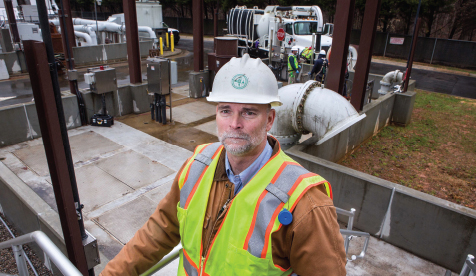Western Wake is flush with behind-the-scenes heroes, people who get up every day to do tough jobs like maintenance, construction, farming, landscaping and clean up, in service of the area’s towns and people. Without them the beautiful and rich community of Western Wake might not enjoy the abundance of amenities that attract and keep people here. There will always be dirty jobs, and these individuals do them with passion.
Drew Cade
Park Manager, Lake Crabtree County Park
 It’s not unusual for Drew Cade to receive a picture message of a downed tree across a trail at Lake Crabtree County Park. Cade is park manager of Wake County’s oldest regional park, and in his 11 years of service has developed many close relationships with the park’s users. Cade then treks off through the park’s nine miles of trails, chainsaw in hand, to clear the tree for the cyclists, walkers and joggers who visit daily.
It’s not unusual for Drew Cade to receive a picture message of a downed tree across a trail at Lake Crabtree County Park. Cade is park manager of Wake County’s oldest regional park, and in his 11 years of service has developed many close relationships with the park’s users. Cade then treks off through the park’s nine miles of trails, chainsaw in hand, to clear the tree for the cyclists, walkers and joggers who visit daily.
“I knew I wanted to work in a park someday. I literally followed my dream when the opportunity presented itself,” said Cade.
“You are always doing something different — everything from cleaning a bathroom to rebuilding a bridge that might have collapsed in a storm.”
Lake Crabtree County Park has the highest visitation of all the Wake County regional parks, in part because of its diverse offerings: boating, hiking and biking trails, mountain biking skills areas, sand volleyball, picnic shelters and more.
“If I know I’m helping someone by providing an opportunity to go for a hike, those are the moments that make all the mundane things less mundane,” said Cade. “I know that the support work here, like cutting up a tree when it falls across the trail, are the things you have to do. But it’s the projects you see and the new programs on-site, those are the things that make it all worthwhile.”
Early in Cade’s tenure as park manager, a completely unexpected event threatened some of the park’s most popular programs — when PCBs were discovered in the sediment and wildlife of Lake Crabtree, Brier Creek and Crabtree Creek. Uncontrolled storm water runoff from the Ward Transformer Company, located near Raleigh-Durham International Airport, leached the hazardous chemicals into the surrounding waterways.
 Enduring the biggest challenge of his career, Cade fought a lot of misinformation about what was safe in the park and saw the popular Triangle Triathlon and Community Fisheries programs all but disappear. In the years since, the EPA stepped in to clean up the affected sites and monitor any risks, and the park’s programs have recovered and adapted to provide safe recreation options for visitors.
Enduring the biggest challenge of his career, Cade fought a lot of misinformation about what was safe in the park and saw the popular Triangle Triathlon and Community Fisheries programs all but disappear. In the years since, the EPA stepped in to clean up the affected sites and monitor any risks, and the park’s programs have recovered and adapted to provide safe recreation options for visitors.
“You take that opportunity to educate and inform people about what’s real and what’s known,” said Cade. “There is no known risk to contact with the sediment.”
Working with the multitude of organizations that use Lake Crabtree’s facilities, such as the Carolina Sailing Foundation and the Triangle Model Yacht Club, keeps Cade motivated to continually evolve the park’s offerings to fit the expanding needs of the community.
“I want to offer things even though we don’t have the staff to do it,” said Cade. “My job in a nutshell is to create and maintain opportunity for people.
“You get put in positions where you never envisioned you would be, but it becomes just part of the job. We’re here to serve the public. If it means starting a car, then that’s what you do.”
Paul Campbell
Wastewater Collection System Operator, Town of Cary
 Most of us don’t think twice about access to clean water in our homes. It’s only when a problem arises that we realize how easily day-to-day conveniences can be taken for granted. Paul Campbell prefers it that way, never wanting citizens to notice a disruption in their utilities.
Most of us don’t think twice about access to clean water in our homes. It’s only when a problem arises that we realize how easily day-to-day conveniences can be taken for granted. Paul Campbell prefers it that way, never wanting citizens to notice a disruption in their utilities.
“Customer service is our No. 1 goal, by enriching the lives of our citizens and providing exemplary services,” Campbell said. “What the residents don’t see is how these services are achieved.”
Campbell is the Wastewater Collection System operator for the Town of Cary, overseeing a team of more than 30 men and women who monitor, maintain and repair the systems that keep water clean and accessible.
An employee of the town for more than 20 years, Campbell has seen Cary’s growth and witnessed the importance of quality infrastructure and customer service.
“Cary is a premier place to live and to prosper,” he said. “It’s only that way because the people that work in the town government care and are diligent in their duties at keeping the environment clean.”
If a clean environment for all means Campbell has to get his hands dirty, so be it.
“Sometimes it’s a headache, like every job is,” he said. “But working with these people keeps me coming back every day.”
Campbell’s day-to-day work involves plenty of inspections, future planning and staff scheduling, but he’s also on the ground working with his team to clean the wells at a pump station or aid the recovery from a spill.
“Every day is a challenge, but yet an adventure. In the sewer business, you expect the unexpected,” Campbell said.
Like the hundreds of men and women serving Cary in the public works department, Campbell’s motivation comes from “knowing at the end of the day that we helped put a smile on a citizen’s face and that their systems are working properly.”
Greg Clark
Senior Director, Maintenance and Operations, Wake County Public School System
 In his office off of Rock Quarry Road, Greg Clark’s smartphone chirps a warning. A quick downward glance reveals a priority five situation, the most severe classification given to the rattles and rolls experienced daily across the Wake County Public School System’s buildings, grounds and internal systems.
In his office off of Rock Quarry Road, Greg Clark’s smartphone chirps a warning. A quick downward glance reveals a priority five situation, the most severe classification given to the rattles and rolls experienced daily across the Wake County Public School System’s buildings, grounds and internal systems.
“Priority five means your hair is on fire, fix it now,” said Clark, senior director of maintenance and operations for WCPSS. Examples include a burst pipe, broken heat pump or power outage — things that impact an entire campus or building.
“Anything that has a severe impact on the learning environment. If the kids and teachers aren’t comfortable, their focus isn’t on what they are supposed to be doing, it’s on the facility,” said Clark. “Those are things we pay particular attention to.”
Clark has 30 years of experience working his way up the ranks of the maintenance and operations division of WCPSS. Now he oversees 22 million square feet of buildings and 900 employees spread across Wake County. Everything from custodial services to plumbing, hazardous materials to landscaping and automotive fleet repair falls under Clark’s umbrella.
In addition to upkeep and improvements on buildings, grounds and equipment, Clark jokes: “We’ve experienced over time most of the biblical plagues. Right now we don’t have locusts, we have digger bees.
 “When you hear schools are closed, that’s not us,” said Clark. “We are a 24/7/365 operation. We have boots on the ground out there to make sure that the schools are ready to open by the time upper management is ready to put buses on the ground.”
“When you hear schools are closed, that’s not us,” said Clark. “We are a 24/7/365 operation. We have boots on the ground out there to make sure that the schools are ready to open by the time upper management is ready to put buses on the ground.”
For motivation, Clark credits a dedicated staff who understand the impact of their work.
“There’s not many days, or nights for that matter, that somebody in maintenance doesn’t find a way to pull a rabbit out of a hat so that school operates the next day,” he said.
Clark admits that now he is “the man behind the curtain” often found at his desk working on the annual budget and isn’t out on school grounds as much as he would like.
Thinking of his three children (all WCPSS graduates) and four grandchildren, Clark said, “I will get out of my office occasionally and go to an elementary school and watch the kindergartners follow their teacher down the hall. That reconnects me to why I do what I do.
“Our best day is when no one knows we were there. Everybody’s focus on that campus is on the programs. If they don’t have to think about facility issues, we’ve done well. That’s a good day for us.”
Ben Shields & Patricia Parker
In Good Heart Farm
 “Give me a million dollars, and I’m not going to leave farming. It’s the only thing I ever want to do,” said Ben Shields. Despite a slightly raised eyebrow from his wife and farm partner Patricia Parker, it’s clear the pair have a heart for sustainable farming. And though it may not provide them with traditional riches, farming surrounds them with bounty and wealth in the form of food and community support.
“Give me a million dollars, and I’m not going to leave farming. It’s the only thing I ever want to do,” said Ben Shields. Despite a slightly raised eyebrow from his wife and farm partner Patricia Parker, it’s clear the pair have a heart for sustainable farming. And though it may not provide them with traditional riches, farming surrounds them with bounty and wealth in the form of food and community support.
Shields and Parker are the founders of In Good Heart Farm, a small family farm located in Clayton that serves the greater Cary area through its CSA program and at the Western Wake Farmers’ Market. The farm produces a huge variety of produce from herbs and salad greens to watermelon and strawberries. Farming practices, though not certified, are sustainable and organic, but the farm’s beginnings were difficult and sometimes uncertain.
“In the beginning, we started with nothing,” said Shields.
“We didn’t have a tractor for a year and a half,” added Parker. Without startup capital, the couple relied on money from their CSA members to fund the farm.
“It was important to me that we farm without debt,” said Parker. “Our CSA members are our bank, but they are way better than a bank.”
“They are our friends too,” finished Shields. Events like an annual planting party and October feast help Shields and Parker connect with their members, and vice versa. A new work-share program gives CSA participants a chance to contribute labor in exchange for a reduced share price.
 Still, pay-as-they-go-farming is an ongoing challenge for the couple. Shields and Parker cite many instances when the community helped pull them through tight times, with donations of money, work and support. In return, the couple gives back at every opportunity.
Still, pay-as-they-go-farming is an ongoing challenge for the couple. Shields and Parker cite many instances when the community helped pull them through tight times, with donations of money, work and support. In return, the couple gives back at every opportunity.
Shields serves as the vendor representative on the board of the WWFM. And the two founded Farm It Forward, a program that distributes their produce to people who have limited access to fresh, local food. Partnering with groups like Advocates for Health in Action, WakeMed Energize, the Inter-Faith Food Shuttle and the Cooperative Extension Service, they’ve created a six-week program that provides In Good Heart Farm produce to parents and children who participate in cooking classes to learn how to prepare and enjoy the bounty.
“Asking us if community is important is like asking if air or water is important,” said Parker. “It really helps us survive and thrive. We need it.”
Despite long days, hard labor and Mother Nature’s often unpredictable ways, Shields and Parker feel the rewards of farming far outweigh the struggles.
“The rewards are different,” said Parker, comparing farming to a more traditional career path. Seeing the sunrise, appreciating all the seasons and involving their 2-year-old son, Elliot, in farm life top the pair’s list of advantages.
“We eat like kings and queens,” said Shields. “We enjoy the small luxuries.”






